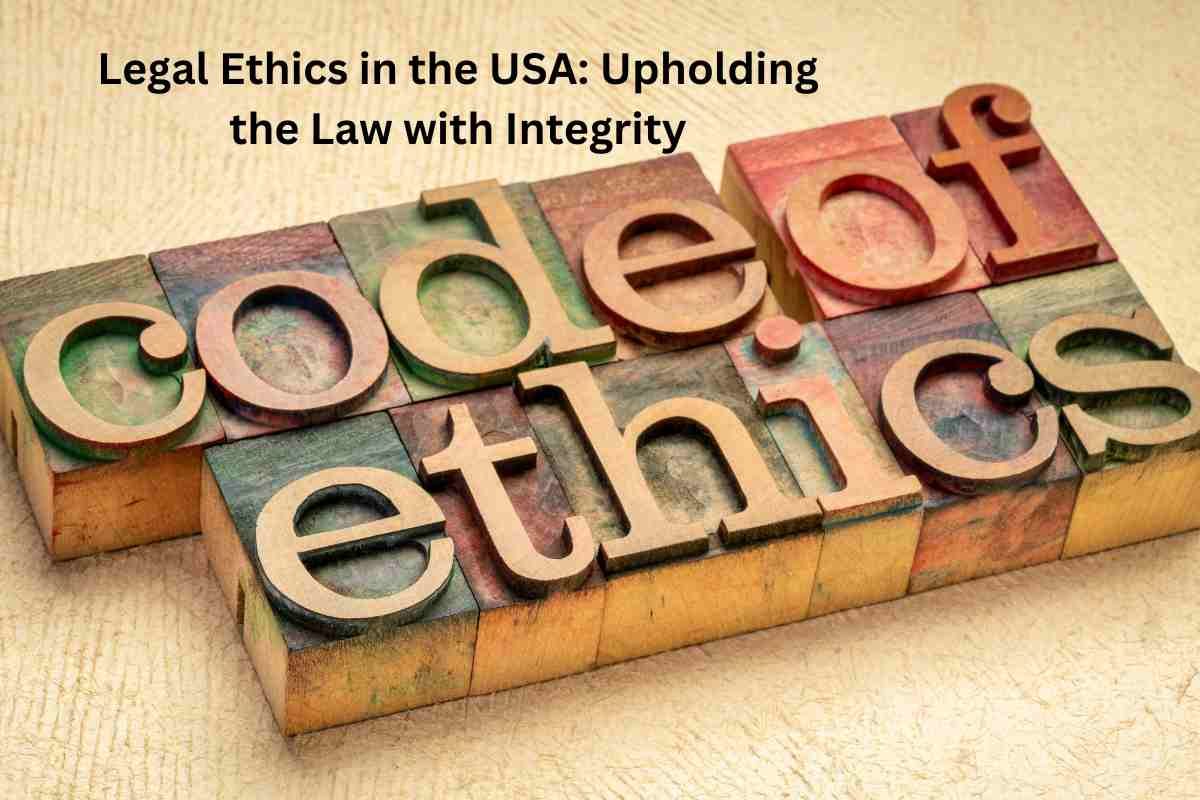Legal Ethics in the USA: Upholding the Law with Integrity

Legal Ethics in the USA: Upholding the Law with Integrity:- In the vast and complex world of the American legal system, the term “legal ethics” holds significant weight. But what exactly does it entail? And why should we care?
Introduction to Legal Ethics
Legal ethics refers to the set of standards and codes that lawyers and judges adhere to in their professional conduct. These principles guide their behaviour, ensuring that they uphold the law’s dignity and serve their clients with the utmost integrity. Legal ethics isn’t just a set of rules; it’s the very foundation of the legal profession.
The Importance of Legal Ethics
Trust in the Legal System
Imagine a world where lawyers could do as they pleased without any accountability. Scary, isn’t it? Legal ethics establishes trust between the public and legal professionals. It ensures that lawyers act in their clients’ best interests and that judges remain impartial. Without this trust, our legal system would crumble.
Protecting Client Rights
Clients divulge personal and sensitive information to their lawyers, trusting them to keep it confidential and use it only in their best interest. Legal ethics ensures that lawyers respect and protect these rights, treating their clients’ information with the respect it deserves.
Key Principles of Legal Ethics
Confidentiality
At the heart of legal ethics is the principle of confidentiality. A lawyer must never disclose any information about a client unless explicitly authorized. This trust forms the backbone of the attorney-client relationship.
Conflict of Interest
Lawyers must avoid situations where their interests might conflict with their clients’. This ensures they always act in their client’s best interests, not for personal gain.
Honesty and Integrity
A lawyer must always be honest, not only with their clients but also with the court. Misleading or lying can lead to severe consequences for the lawyer and their client.
The Role of Bar Associations
Setting Ethical Standards
Bar associations play a pivotal role in setting and maintaining ethical standards for lawyers. They provide guidelines and rules, ensuring that all legal professionals adhere to the highest ethical standards.
Disciplinary Actions
When a lawyer breaches these ethical standards, bar associations have the authority to take disciplinary actions, ranging from warnings to disbarment. This keeps lawyers accountable and maintains the profession’s integrity.
Challenges in Maintaining Legal Ethics
Modern Technology and Ethics
With the rise of technology, new ethical challenges emerge. Lawyers must navigate these challenges from data breaches to online communication, while upholding their ethical obligations.
The Pressure to Win
In a competitive legal landscape, there’s immense pressure to win cases. This can sometimes lead to ethical boundaries being pushed. Lawyers must resist this temptation and remember their primary duty: to uphold the law with integrity.
The Future of Legal Ethics
As the legal landscape evolves, so too will the ethical challenges lawyers face. However, the core principles of trust, integrity, and serving justice will always remain. It’s up to every legal professional to carry this torch forward, ensuring that the law remains a beacon of hope and fairness for all.
Conclusion: Legal Ethics in the USA
Legal ethics in the USA isn’t just about following a set of rules. It’s about upholding the law’s dignity, ensuring fairness, and maintaining public trust. As we move into the future, the importance of legal ethics will only grow, shaping how lawyers serve their clients and the justice system.
FAQs: Legal Ethics in the USA
- What are legal ethics?
- Legal ethics are the standards and codes that lawyers and judges follow in their professional conduct.
- Why is confidentiality essential in legal ethics?
- Confidentiality ensures that clients can trust their lawyers with sensitive information, forming the foundation of the attorney-client relationship.
- How do bar associations maintain ethical standards?
- Bar associations set guidelines and rules for lawyers and have the authority to take disciplinary actions against those who breach these standards.
- What challenges does modern technology pose to legal ethics?
- Technology brings challenges like data breaches and online communication, requiring lawyers to navigate these while maintaining their ethical obligations.
- Do the same ethical standards bind all lawyers?
- While the core principles remain the same, different jurisdictions might have specific rules and guidelines. However, the essence of serving with integrity is universal.







